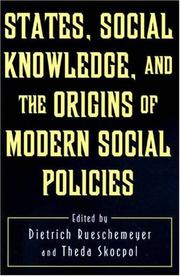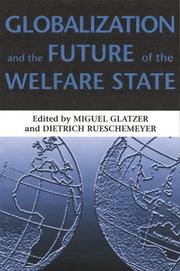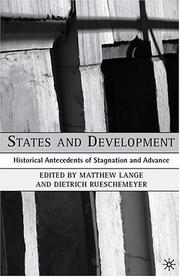Digital
ISBN: 9781400830671 9780691129594 Year: 2009 Publisher: Princeton, N.J. Princeton University Press
Abstract | Keywords | Export | Availability | Bookmark
 Loading...
Loading...Choose an application
- Reference Manager
- EndNote
- RefWorks (Direct export to RefWorks)
Book
ISBN: 0691129584 0691129592 1282754610 1400830672 9786612754616 Year: 2009 Publisher: Princeton Princeton University Press
Abstract | Keywords | Export | Availability | Bookmark
 Loading...
Loading...Choose an application
- Reference Manager
- EndNote
- RefWorks (Direct export to RefWorks)
Book
ISBN: 0674422686 0674422708 Year: 1973 Publisher: Harvard University Press
Abstract | Keywords | Export | Availability | Bookmark
 Loading...
Loading...Choose an application
- Reference Manager
- EndNote
- RefWorks (Direct export to RefWorks)

ISBN: 0691034443 069100112X 9780691001128 069160455X 0691654077 1400887402 Year: 1996 Publisher: Princeton: Princeton university press,
Abstract | Keywords | Export | Availability | Bookmark
 Loading...
Loading...Choose an application
- Reference Manager
- EndNote
- RefWorks (Direct export to RefWorks)
From the 1850s to the 1920s, laws regulating the industrial labor process, pensions for the elderly, unemployment insurance, and measures to educate and ensure the welfare of children were enacted in many industrializing capitalist nations. This same period saw the development of modern social sciences. The eight essays collected here examine the reciprocal influence of social policy and academic research in comparative context, ranging across policy areas and encompassing developments in Britain, the United States, Germany, France, Canada, Scandinavia, and Japan. Introduced by the editors, the essays include Part I on the emergence of modern social knowledge by Ira Katznelson, Anson Rabinbach, and Björn Wittrock and Peter Wagner; Part II on reformist social scientists and public policymaking by Dietrich Rueschemeyer and Ronan Van Rossem, Libby Schweber, and John R. Sutton; Part III on state managers and the uses of social knowledge by Stein Kuhnle and Sheldon Garon, and a conclusion by Rueschemeyer and Theda Skocpol.Originally published in 1995.The Princeton Legacy Library uses the latest print-on-demand technology to again make available previously out-of-print books from the distinguished backlist of Princeton University Press. These editions preserve the original texts of these important books while presenting them in durable paperback and hardcover editions. The goal of the Princeton Legacy Library is to vastly increase access to the rich scholarly heritage found in the thousands of books published by Princeton University Press since its founding in 1905.
Social policy --- anno 1800-1999 --- Knowledge, Sociology of --- Sociologie de la connaissance --- Politique sociale --- Social policy. --- Knowledge, Sociology of.
Book
ISBN: 1555873111 9781555873110 1685856349 Year: 1992 Publisher: Boulder (Colo.): Lynne Rienner,
Abstract | Keywords | Export | Availability | Bookmark
 Loading...
Loading...Choose an application
- Reference Manager
- EndNote
- RefWorks (Direct export to RefWorks)
Economic order --- Economic development --- Economic policy --- Markets --- Industrial policy --- Free enterprise

ISBN: 0822958619 1322068631 0822972697 9780822972693 9780822958611 Year: 2005 Publisher: Pittsburgh: University of Pittsburgh Press,
Abstract | Keywords | Export | Availability | Bookmark
 Loading...
Loading...Choose an application
- Reference Manager
- EndNote
- RefWorks (Direct export to RefWorks)
"Beginning in the last quarter of the twentieth century, the global political economy has undergone a profound transformation. Democracy has swept the globe, and both rich and developing nations must compete in an increasingly integrated world economy." "How are social welfare policies being affected by this wave of economic globalization? Leading researchers explore the complex question in this comparative study. The developing countries they analyze in Globalization and the Future of the Welfare State demonstrate that although there is great variability across countries and regions, domestic political processes and institutions play key roles in managing the disruptions wrought by globalization."--Jacket
Social policy. --- Welfare state. --- Globalization --- Social aspects. --- #SBIB:316.8H40 --- #SBIB:35H437 --- Sociaal beleid: social policy, sociale zekerheid, verzorgingsstaat --- Beleidssectoren: sociale zekerheid --- Social policy --- Welfare state --- State, Welfare --- Economic policy --- Public welfare --- State, The --- Welfare economics --- National planning --- State planning --- Family policy --- Social history --- Social aspects --- Globalization - Social aspects.

ISBN: 9781403964939 1403964920 1403964939 9786611369408 1281369403 1403982686 Year: 2010 Publisher: New York, N.Y. Palgrave Macmillan
Abstract | Keywords | Export | Availability | Bookmark
 Loading...
Loading...Choose an application
- Reference Manager
- EndNote
- RefWorks (Direct export to RefWorks)
One of the most important issues in comparative politics is the relationship between the state and society and the implications of different relationships for long-term social and economic development. Exploring the contribution states can make to overcoming collective action problems and creating collective goods favourable to social, economic, and political development, the contributors to this significant volume examine how state-society relations as well as features of state structure shape the conditions under which states seek to advance development and the conditions that make success more or less likely. Particular focus is given to bureaucratic oversight, market functioning, and the assertion of democratic demands discipline state actions and contribute to state effectiveness. These propositions and the social mechanisms underlying them are examined in comparative historical and cross-national statistical analyses. The conclusion will also evaluate the results for current policy concerns.
Economic policy and planning (general) --- Political systems --- Comparative government --- Economic development --- Nationalism --- Political development --- State, The --- Comparative politics. --- International relations. --- Political science. --- World politics. --- Political economy. --- Social policy. --- Comparative Politics. --- International Relations. --- Political Science. --- Political History. --- International Political Economy. --- Social Policy.

ISBN: 0521816106 0521016452 1107713595 1107710758 0511803966 9780521016452 9780521816106 9780511803963 Year: 2006 Publisher: Cambridge: Cambridge university press,
Abstract | Keywords | Export | Availability | Bookmark
 Loading...
Loading...Choose an application
- Reference Manager
- EndNote
- RefWorks (Direct export to RefWorks)
This book systematically investigates the past accomplishments and future agendas of contemporary comparative-historical analysis. Its core essays explore three major issues: the accumulation of knowledge in the field over the past three decades, the analytic tools used to study temporal process and historical patterns, and the methodologies available for making inferences and for building theories. The introductory and concluding essays situate the field as a whole by comparing it to alternative approaches within the social sciences. Comparative Historical Analysis in the Social Sciences will serve as an invaluable resource for scholars in the field, and it will represent a challenge to many other social scientists - especially those who have raised skeptical concerns about comparative-historical analysis in the past.
Social sciences --- Sciences sociales --- Research --- Methodology --- Recherche --- Méthodologie --- -Geschiedwetenschap. Hulpwetenschappen van de geschiedenis --- #SBIB:033.AANKOOP --- #SBIB:303H60 --- #SBIB:93H1 --- Behavioral sciences --- Human sciences --- Sciences, Social --- Social science --- Social studies --- Civilization --- Research&delete& --- Bijzondere methoden: algemeen --- Geschiedwetenschap. Hulpwetenschappen van de geschiedenis --- Methodology. --- Social sciences - Research - Methodology --- Sociological theory building --- Methods in social research (general)
Book
Abstract | Keywords | Export | Availability | Bookmark
 Loading...
Loading...Choose an application
- Reference Manager
- EndNote
- RefWorks (Direct export to RefWorks)
Book
ISBN: 0691654077 069160455X Year: 2017 Publisher: Princeton, New Jersey ; New York, [New York] : Princeton University Press : Russeli Sage Foundation,
Abstract | Keywords | Export | Availability | Bookmark
 Loading...
Loading...Choose an application
- Reference Manager
- EndNote
- RefWorks (Direct export to RefWorks)
From the 1850s to the 1920s, laws regulating the industrial labor process, pensions for the elderly, unemployment insurance, and measures to educate and ensure the welfare of children were enacted in many industrializing capitalist nations. This same period saw the development of modern social sciences. The eight essays collected here examine the reciprocal influence of social policy and academic research in comparative context, ranging across policy areas and encompassing developments in Britain, the United States, Germany, France, Canada, Scandinavia, and Japan. Introduced by the editors, the essays include Part I on the emergence of modern social knowledge by Ira Katznelson, Anson Rabinbach, and Björn Wittrock and Peter Wagner; Part II on reformist social scientists and public policymaking by Dietrich Rueschemeyer and Ronan Van Rossem, Libby Schweber, and John R. Sutton; Part III on state managers and the uses of social knowledge by Stein Kuhnle and Sheldon Garon, and a conclusion by Rueschemeyer and Theda Skocpol.Originally published in 1995.The Princeton Legacy Library uses the latest print-on-demand technology to again make available previously out-of-print books from the distinguished backlist of Princeton University Press. These editions preserve the original texts of these important books while presenting them in durable paperback and hardcover editions. The goal of the Princeton Legacy Library is to vastly increase access to the rich scholarly heritage found in the thousands of books published by Princeton University Press since its founding in 1905.

 Search
Search Feedback
Feedback About UniCat
About UniCat  Help
Help News
News